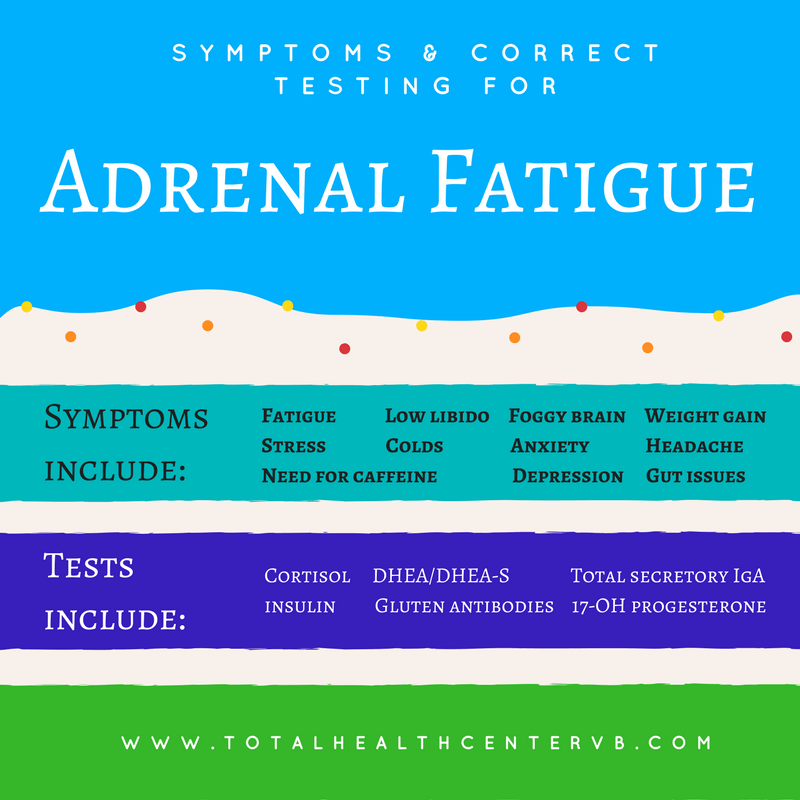
Often new patients come into our practice complaining of tiredness, where the alarm disturbs rather than wakes and getting up and ready for each day is difficult.
Coffee is reported as an indispensible best friend, although it doesn’t ease the brain fog or poor memory. Energy slumps snatch their focus at around 3-5pm and 7-10pm, yet if they stay up longer a frustrating second wind settles in, making it difficult to sleep and compounding fatigue.
These signs, plus others we will talk about in a moment, can indicate the presence of an underlying condition called adrenal fatigue. A commonly overlooked and little understood functional syndrome that can wreak havoc on a sufferer’s wellbeing.
What Is Adrenal Fatigue?
First, let’s take a look at the adrenal glands, as understanding these small powerhouses is important in understanding this condition.
The adrenal glands sit on top of your kidneys and look like a biological cap, one on each side of your body. Their role is to produce hormones important to your health and function, including cortisol, aldosterone, dehydroepiandrosterone (DHEA) and androgenic steroids, and epinephrine and norepinephrine (also called adrenaline and noradrenaline). One of their most critical roles is in the body’s ability to respond to stress.
Why?
When the stress response is triggered, snap, epinephrine (adrenaline) and cortisol are released and the body immediately enters a fight or flight response. This is crucial so we can react without delay: a potentially lifesaving design.
Back when the proverbial sabre tooth tiger roamed the lands, this was key. The stress response immediately reduces our digestive and reproductive functions (not essential in a short term survival situation), increases our blood sugar levels and blood pressure (to provide the nutrients to fight or flee), dilates our pupils and enhances our focus on looking for escape routes (while decreasing our ability to perform complicated mental processes, as again these are not needed for immediate survival).
In the short term, this rerouting of resources to those needed imminently is a faultless, well considered design.
However, with modern day stressors composed of ever-present mental and even physical (though rarely life threatening) situations, the fight or flight response is active… without rest and essential recovery.
When this happens, there is little time for our body to recoup. Our adrenal glands consistently produce epinephrine and cortisol, which induce their bodily effects, until the glands eventually fatigue.
This leads to the presence of this syndrome, with…
Adrenal Fatigue Signs and Symptoms
Common signs and symptoms of adrenal fatigue include:
Difficulty waking (fond of hitting the snooze button, again and again?)
Low libido
A foggy brain and trouble with concentration
Weight gain, particularly around the middle
Consuming caffeine containing products to stay alert (coffee, cola, caffeine supplements)
Light-headedness on standing
Stress intolerance
Depression
Anxiety
Digestive issues (constipation, diarrhea, pain)
Headache
Constant colds and immune challenges
While this list is not exhaustive, it includes many of the most common problems I see in patients with adrenal fatigue. I have been helping people with this syndrome successfully for years, and know how important it is to conduct the appropriate tests, as on occasion another condition – requiring a different approach – can present in a similar way.
The Optimal Adrenal Stress Tests
To ensure the best outcomes, we must test for adrenal fatigue in the right way to gain the correct base to create an optimal path back to health. I use and recommend…
The Diagnos-Techs Adrenal Stress Index (ASI)
This test panel is non-invasive and assesses the impact of stress on the body. It includes 10 tests for six different hormones and immune markers that may be affected by chronic stress and stress-related conditions.
Picture credit: www.DiagnosTechs.com
Why These Are Must-Do Assessments To Test for Adrenal Fatigue?
This common condition is often missed, and many mainstream health practitioners are, for the most part, unaware of adrenal fatigue. This can lead to years of unnecessary suffering.
Testing for this syndrome must include:
Cortisol
As mentioned earlier, cortisol is one of the fundamental hormones involved in the stress response. This hormone fluctuates over the course of the day so one test only can lead to inaccurate results and conclusions.
Cortisol levels can adversely impact many areas of the body, including:
– Energy production, which is why so many people with adrenal fatigue feel exhausted
– Immune function, leading to colds, respiratory infections, sore throats and the potential aggravation of autoimmune dis-eases and allergies
– Issues with skin health
– Musculoskeletal issues, with pain and damage due to reduced recovery and healing
– Insufficient restorative sleep
– Reduced thyroid function, and possible resultant hypothyroidism
– Challenges to brain capability and emotional health
– Blood sugar issues, which brings me to the importance of testing for insulin resistance…
Insulin
To maintain ideal blood sugar levels, our body produces the hormone, insulin. As you know, wet sugar is sticky stuff and too much in our bloodstream is dangerous. In healthy circumstances, when blood sugar levels rise, so too does insulin, as it is the hormone that guides the extra sugar from the blood and into the safe harbor of the cells. When faced with stress, however, our body acts to keep additional sugar in the blood, where it is available for immediate use. This provides the energy to fight or flee and in the short term is an appropriate survival mechanism. To do this, insulin is down regulated and becomes less effective i.e. your body becomes insulin resistant.
In the longer term, insulin resistance is linked to dangerous dis-eases like heart dis-ease, cancer, diabetes, and even depression. Insulin is therefore an important marker of stress and a compass for future ill health if not corrected promptly.
DHEA/DHEA-S
As Nicole Maninger and her research team noted in the journal, Psychoneuroendocrinology, “DHEA-S concentrations increase in response to both acute and chronic stress and provide another measure… that parallels cortisol during acute responses to stress but diverges in chronic or repeated stress.” This provides insight into the chronicity of stress.
Ah, but I’m not stressed you say!
I remember hearing a single Mom with five children and financial difficulties mutter these very words. Let me digress for a moment and talk about the concept of allostasis, and the incredible human beings ability to keep going in the short to medium term.
Allostasis refers to our ability to adapt to stress and maintain homeostasis, or balance, equilibrium. We can experience a period of stress and with sufficient food intake (and so nutritional sustenance) seemingly recover. We can feel, like the above Mom said, that we are ‘not stressed’. Yet there remains the underlying, dangerous hum of hormonal discontent.
Tests like these help determine whether stress is present and adversely impacting on your health.
Note: If you are experiencing signs and symptoms similar to those above, these are not normal or healthy.
Total secretory IgA
This test assesses the affect stress is having on the function of the immune system.
17-OH progesterone
There are a number of conditions that can alter cortisol levels. To be able to hone in on the correct treatment and achieve the best outcome, it is important to ascertain the cause. Find the source, as a colleague of mine says. The 17-OH progesterone test helps us to do this.
Gluten antibodies
An immune response to gluten is an important, but commonly missed diagnosis that results in increased stress and inflammation within the body and potential emotional and mental stress responses as well. Anxiety, depression and mood disorders occur more frequently in those with celiac disease (and gluten insensitivity). When addressing adrenal fatigue, is it important to understand the presence and impact of gluten antibodies.
With any health challenge is it imperative to uncover the correct diagnosis promptly as this guides the most efficient and effective treatment and outcomes. I am dedicated to bringing you the health that you deserve and to do this, it is helpful to test for adrenal fatigue where clinically indicated.
And it’s important in transforming your health!
